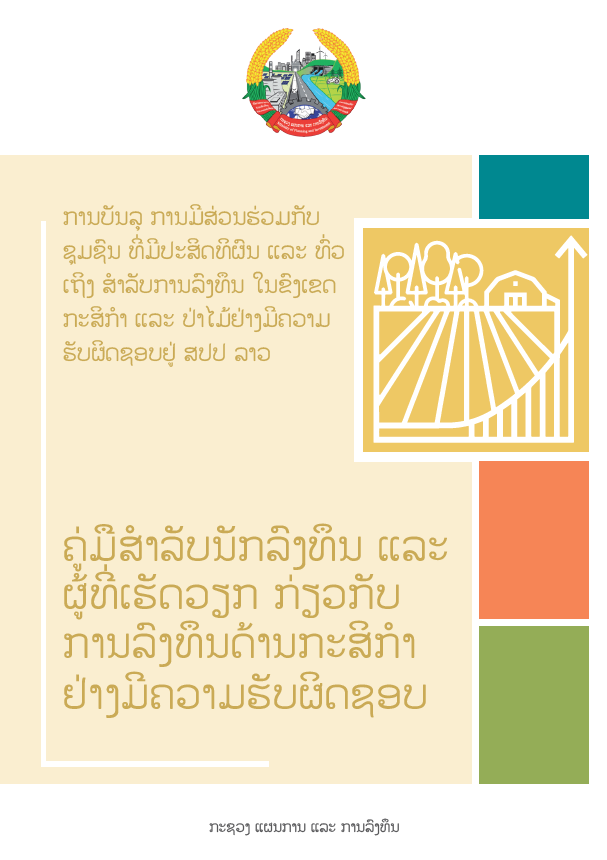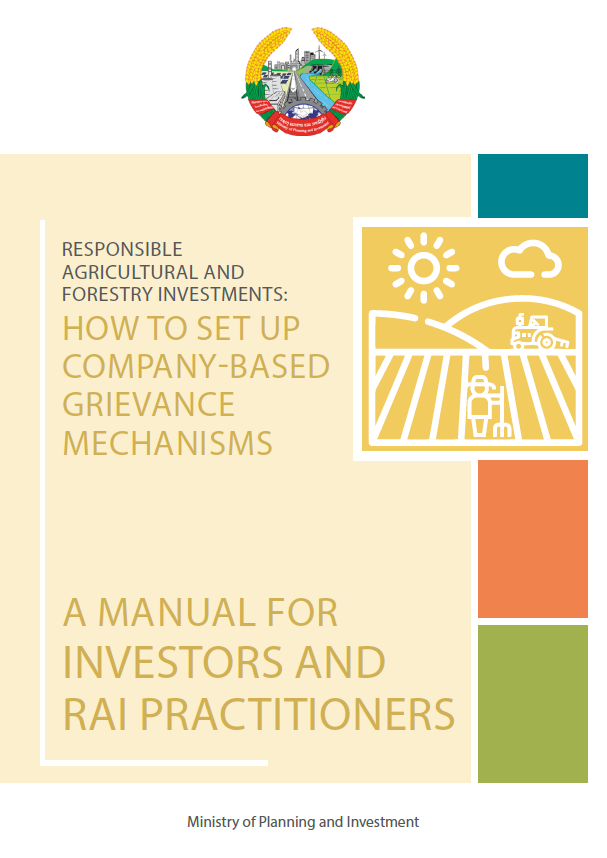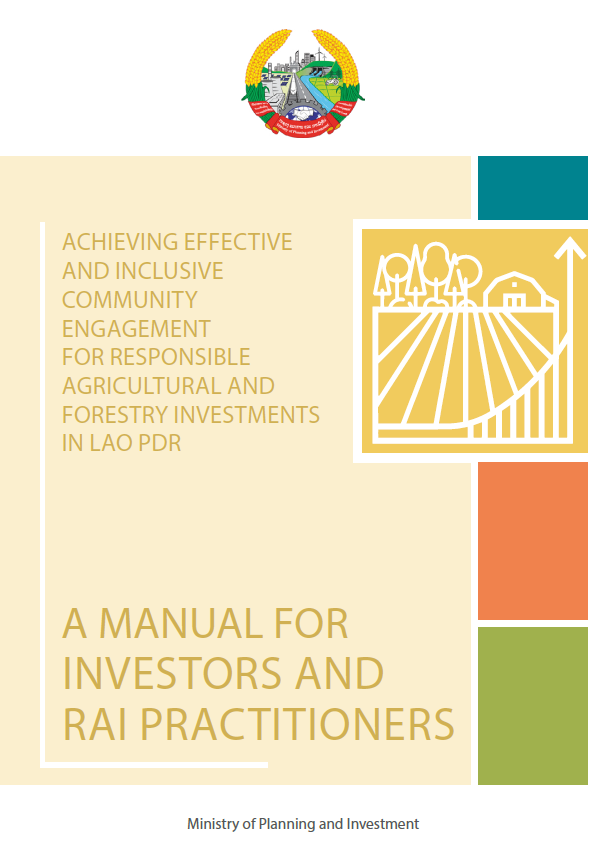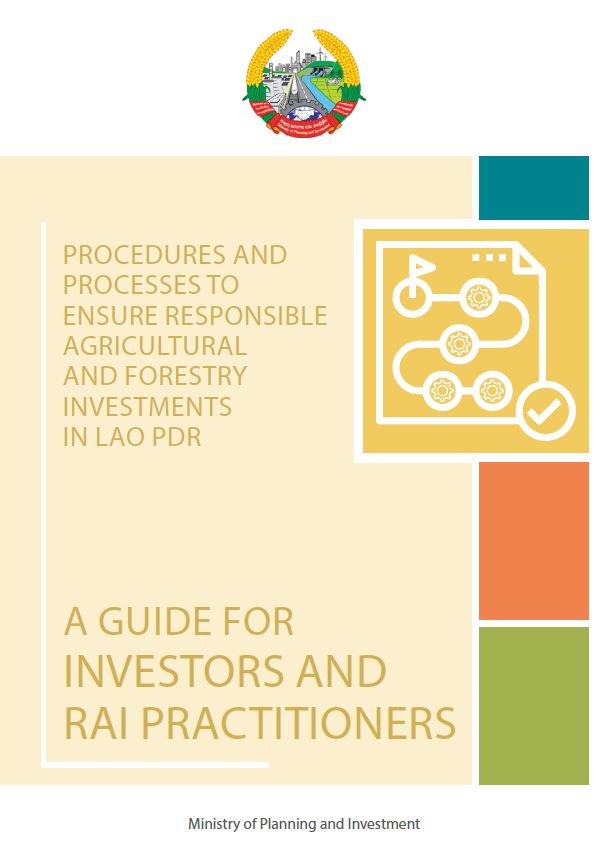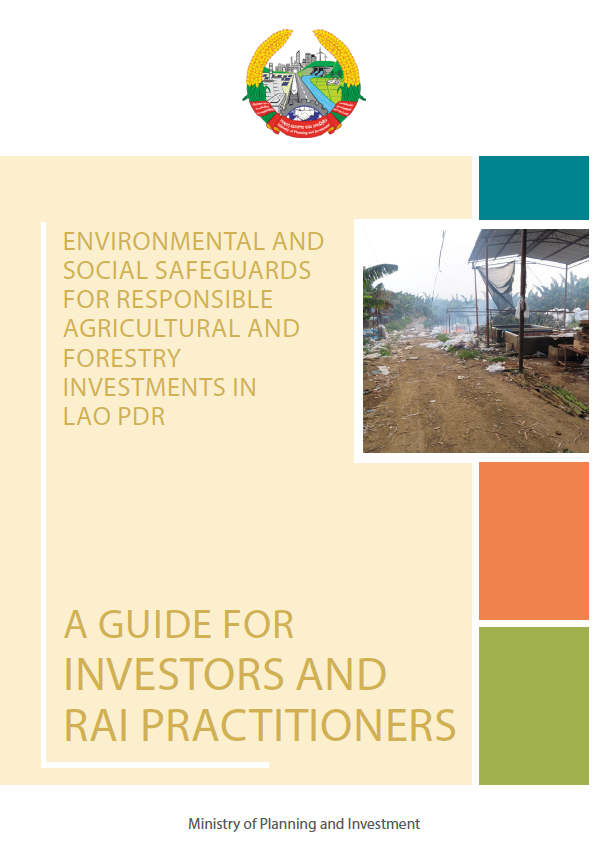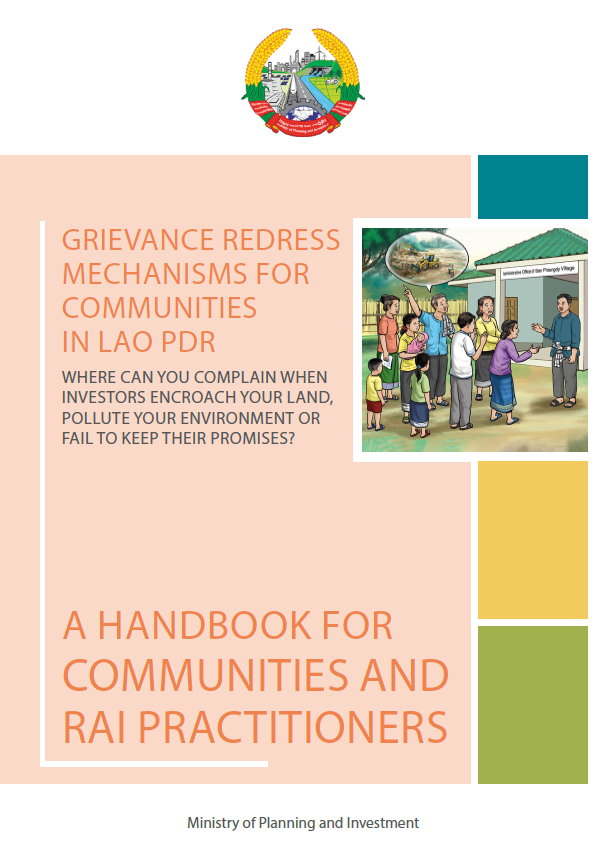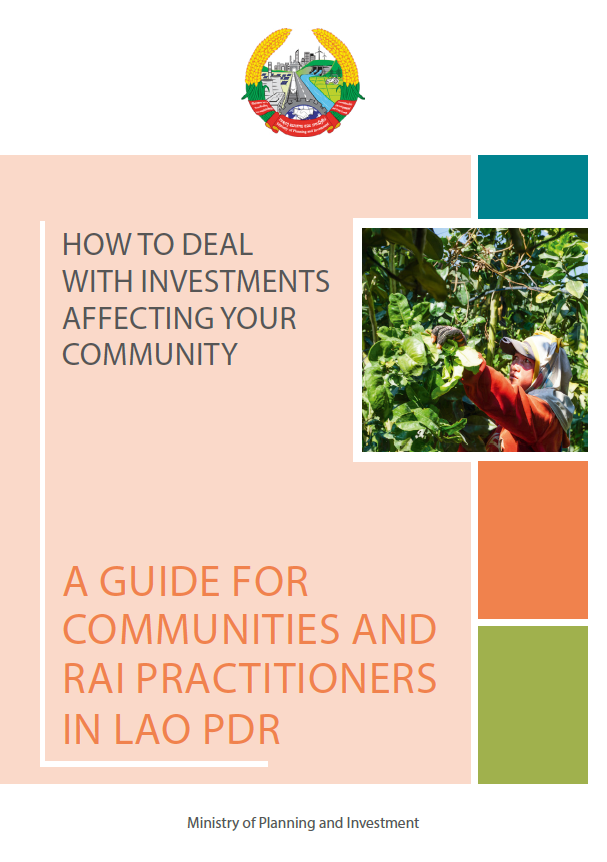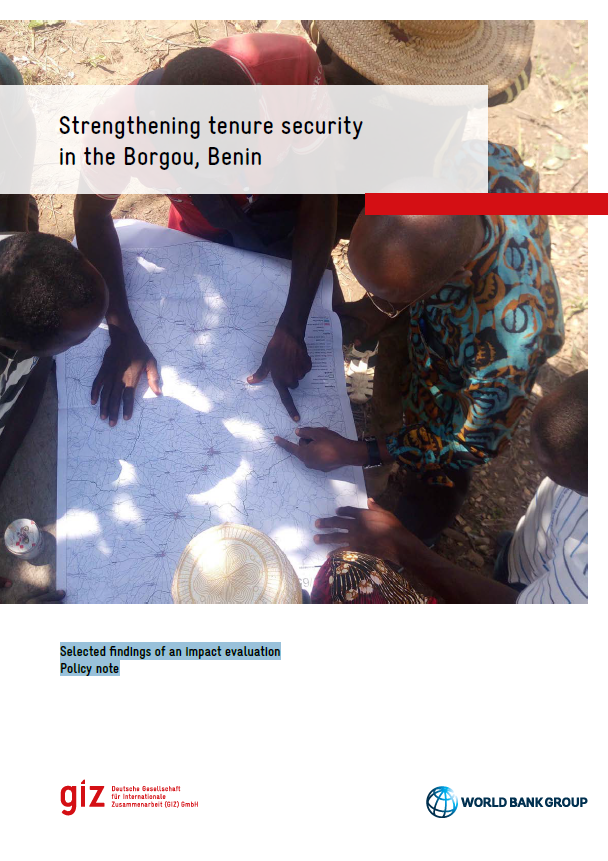
Topics and Regions
Details
Location
Contributions
Displaying 11 - 20 of 128ການບັນລຸ ການມີສ່ວນຮ່ວມກັບ ຊຸມຊົນ ທີ່ມີປະສິດທິຜົນ ແລະ ທົ່ວ ເຖິງ ສຳລັບການລົງທຶນ ໃນຂົງເຂດ ກະສິກຳ ແລະ ປ່າໄມ້ຢ່າງມີຄວາມ ຮັບຜິດຊອບຢູ່ ສປປ ລາວ
ການລົງທຶນໃນຂົງເຂດກະສິກໍາ ສາມາດເປັນທ່າແຮງອັນໃຫຍ່ຫຼວງໜຶ່ງໃນການປະກອບສ່ວນເຂົ້າໃນການພັດທະ ນາເສດຖະກິດ ແລະ ສັງຄົມຂອງ ສປປ ລາວ. ເຖິງແນວໃດກໍ່ຕາມ, ການລົງທຶນເຫຼົ່ານີ້ອາດສົ່ງຜົນກະທົບດ້ານລົບຕໍ່ຊັບ ພະຍາກອນທ້ອງຖິ່ນ ແລະ ອາດເປັນໄພຄຸກຄານ ຕໍ່ຊີວິດການເປັນຢູ່ຂອງປະຊາຊົນໄດ້ ຖ້າບໍ່ໄດ້ຮັບການວາງແຜນ ແລະ ຈັດຕັ້ງປະຕິບັດຢ່າງມີ ຄວາມຮັບຜິດຊອບຕໍ່ສັງຄົມ ແລະ ສິ່ງແວດລ້ອມ, ເຊິ່ງສາມາດນຳໄປສູ່ການເຊື່ອມໂຊມຂອງດິນ, ນ້ຳ ແລະ ສ້າງຄວາມເສຍຫາຍ ຕໍ່ຊີວະນາໆພັນຂອງປະເທດ.
ການລົງທຶນ ໃນຂະແໜງກະສິກຳ ແລະ ປ່າໄມ້ ຢ່າງມີຄວາມຮັບຜິດຊອບ: ຈະສ້າງກົນໄກການ ແກ້ໄຂຄຳຮ້ອງທຸກ ຂອງບໍລິສັດແນວໃດ?
ການລົງທຶນໃນຂົງເຂດທີ່ດິນ ແລະ ຊັບພະຍາກອນທຳມະຊາດ ມັກຈະເຮັດໃຫ້ເກີດມີຂໍ້ຂັດແຍ່ງທາງດ້ານສັງຄົມ. ຖ້າຂໍ້ຂັດແຍ່ງ ເຫຼົ່ານັ້ນບໍ່ໄດ້ຮັບການແກ້ໄຂຢ່າງເໝາະສົມ ຈະບໍ່ພຽງແຕ່ສ້າງຜົນກະທົບຕໍ່ຊີວິດການເປັນຢູ່ຂອງຊຸມຊົນທ້ອງຖິ່ນເທົ່ານັ້ນ ແຕ່ຍັງຈະ ເຮັດໃຫ້ຄວາມສຳເລັດໃນການດຳເນີນທຸລະກິດມີຄວາມສ່ຽງໄປນຳ. ຜູ້ລົງທຶນອາດຈະປະເຊີນກັບການສູນເສຍທາງດ້ານງົບປະມານ ແລະ ຄວາມເສຍຫາຍຕໍ່ຊື່ສຽງ. ໂດຍອີງຕາມມາດຕະຖານສາກົນແລ້ວ ບັນດາບໍລິສັດ ມີຄວາມຈຳເປັນຕ້ອງມີກົນໄກການແກ້ໄຂ ຄໍາຮ້ອງທຸກທີ່ມີປະສິດທິພາບ ແລະ ສະໜອງກົນໄກການແກ້ໄຂບັນຫາທີ່ເກີດຂຶ້ນໃນເວລາດຳເນີນການລົງທຶນ ເປັນຕົ້ນແມ່ນຜົນ ກະທົບຂອງໂຄງການລົງທຶນ ທີ່ອາດຈະເກີດຂຶ້ນຕໍ່ສິ່ງແວດລ້ອມ ແລະ ສັງຄົມ.
Responsible Agricultural and Forestry Investments: How to Set Up Company-based Grievance Mechanisms
This handbook explains investors the necessity of company-based grievance redress mechanisms and how to establish them in order to manage the concerns and grievances of their workers, affected local communities and other stakeholders.
Achieving Effective and Inclusive Community Engagement for Responsible Agricultural and Forestry Investments in Lao PDR
This manual provides practical guides and tools for effective and inclusive engagement with affected communities in different stages and processes throughout the investment cycles from planning, operation and closing.
Procedures and Processes to Ensure Responsible Agricultural and Forestry Investments in Lao PDR
This guides provides steps that investors have to take to establish an agricultural and forestry investment in Laos, and the key processes involved e.g. land acquisition and clearing, labour, import and export in the investment operation, and social and environmental rehabilitation in the closure phase.
Environmental and Social Safeguards for Responsible Agricultural and Forestry Investments in Lao PDR (2023)
This guide aims to help investors identify the impacts and mitigation measures to minimize the impacts of the proposed investments in the agricultural and forestry sector in Laos. Further, the document provides guides on measures for environmental and social safeguards throughout the investment cycles.
Grievance Redress Mechanisms for Communities in Lao PDR
This handbook aims to help local communities affected by an investment to access a company-based grievance mechanism, official government conflict resolution mechanisms or village-level mediation when they feel that investors violate their rights or have a concern about the investment operation in their regions.
How to Deal with Investments Affecting your Communities
This brochure is designed to help local communities who may be affected by land-based investments to prepare, know what to expect, negotiate and engage with a proposed investment in their community.
Strengthening tenure security in the Borgou, Benin
Increasing investment by smallholders in agriculture and livestock is essential for improving food security, income and resilience to climate change, but can be constrained by tenure insecurity. To help overcome the barriers faced in improving land tenure security, the Deutsche Gesellschaft für Internationale Zusammenarbeit (GIZ) German Federal Ministry for Economic Cooperation and Development (BMZ) launched the Global Project on Responsible Land Policy (GPRLP), which is testing interventions, evaluating impact and drawing lessons for scaling.
Responsible Land Policy in Cameroon
Context
Reliable access to land plays a central role in food security and poverty reduction as well as for the sustainable use of natural resources. In contrast, poorly defined land use rights encourage conflicts between different population and land user groups and prevent investment in the conservation and restoration of biodiverse landscapes.
In Cameroon, the outdated legislation in need of reform does not allow adequate and affordable recognition of land use rights. Especially in rural areas, land use is mainly governed by customary regimes which are not systematically documented or legally recognized. Traditional land management is often based on collective rather than individual ownership. Women, young people and marginalised groups are especially disadvantaged in accessing land.
Approach
The project "Responsible Land Policy" (ProPFR) in Cameroon contributes to strengthening land use rights in the Centre Region, safeguarding the livelihoods of the rural population and at the same time promoting the protection and restoration of forest-rich landscapes. It supports sustainable access to land, particularly for women, young people and marginalised groups (e.g., Mbororo pastoralists and internally displaced persons), as well as in resolving land conflicts, especially of an agropastoral nature.
The project’s systematic approach aims to improve the documentation of individual and collective tenure and land use rights to forest, agricultural as well as pasture land, and their recognition by national, regional and local as well as traditional authorities. Furthermore, civil society and private sector actors are involved and strengthened in the implementation of responsible land policies.
| Project objective
The access to land as an essential prerequisite for restoring and preserving forest landscapes and combating poverty and hunger in rural areas has improved for specific population groups, particularly women and marginalised groups, in the Centre Region of Cameroon. The project aims to
|

